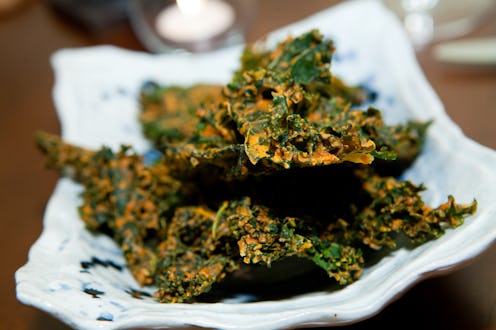Life
Is Kale Bad for Your Health?
In a recent New York Times op-ed, long-time health foodie Jennifer Berman implicates kale and juicing in the development of her bad teeth and hypothyroid disease. Huh? Let's explore.
Berman starts the piece — titled "Kale? Juicing? Trouble Ahead" — with the not-so-humble brag: "I was into health food before it was cool." But, all of her favorite health foods are now allegedly off-limits due to a recent hypothyroidism diagnosis. Her doctor gave her no such instruction, but she looked it up on the Internet and found hypothyroid patients should avoid broccoli, Brussels sprouts, cauliflower, kale, flax, almonds, and soy, among other things.
We're never told why hypothyroid patients should avoid certain foods. And we're certainly not given any evidence that these foods cause thyroid problems, as the title suggests. But Berman moves on to the dentist, where she's greeted with a mouth full of cavities. Her? Cavities? But I drink only fresh vegetable juices and water with lemon! she protests.
Her dentist allegedly tells her she'd "be better off with chocolate and cola." The natural sugars in fruits and vegetables can cause tooth decay, and lemon juice can erode teeth enamel. So Berman goes home from the dentist and eats a Twinkie.
Now for anyone not trying to be contrary for the hell of it, the idea that fruits and vegetables are worse for teeth than sugar and soda is absurd. Sodas are highly acidic, which can both stain teeth and break down tooth enamel. Sugar breeds bacteria in the mouth, which leads to plaque and tooth decay. Yes, fruits and veggies have natural sugars, but they tend to be much lower in sugar than candy and cola, in addition to containing other good-for-you nutrients. And some of these other nutrients actually work to strengthen and un-stain teeth.
Lemons, in fact, are high in natural teeth whitener malic acid, according to Manhattan dentist Marc Liechtung. Greens, meanwhile, are high in iron, which helps form an acid-resistant, enamel-protecting barrier on teeth. The enzyme bromelain, found in pineapple, can help dissolve problem-causing plaques. And any foods that increase saliva production — including apples, pears, cauliflower, and cucumber — have a teeth-protective effect, too.
So maybe Berman needs to get a new dentist. Or maybe she needs to consider that the benefits of eating healthily far outweigh the risks.
